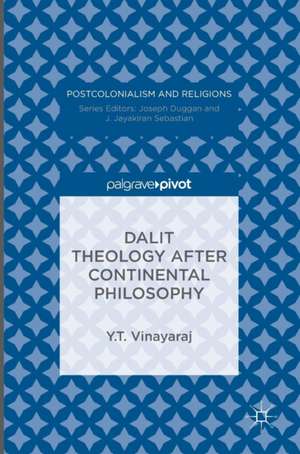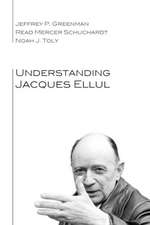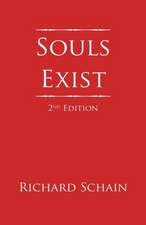Dalit Theology after Continental Philosophy: Postcolonialism and Religions
Autor Y.T. Vinayarajen Limba Engleză Hardback – 26 iul 2016
| Toate formatele și edițiile | Preț | Express |
|---|---|---|
| Paperback (1) | 379.09 lei 6-8 săpt. | |
| Springer International Publishing – 31 mai 2018 | 379.09 lei 6-8 săpt. | |
| Hardback (1) | 385.25 lei 6-8 săpt. | |
| Springer International Publishing – 26 iul 2016 | 385.25 lei 6-8 săpt. |
Din seria Postcolonialism and Religions
- 20%
 Preț: 690.78 lei
Preț: 690.78 lei - 15%
 Preț: 583.61 lei
Preț: 583.61 lei -
 Preț: 388.72 lei
Preț: 388.72 lei - 15%
 Preț: 643.34 lei
Preț: 643.34 lei - 15%
 Preț: 584.43 lei
Preț: 584.43 lei - 15%
 Preț: 520.61 lei
Preț: 520.61 lei - 18%
 Preț: 782.24 lei
Preț: 782.24 lei - 18%
 Preț: 782.87 lei
Preț: 782.87 lei - 18%
 Preț: 947.67 lei
Preț: 947.67 lei -
 Preț: 387.38 lei
Preț: 387.38 lei -
 Preț: 387.38 lei
Preț: 387.38 lei -
 Preț: 387.58 lei
Preț: 387.58 lei - 18%
 Preț: 781.15 lei
Preț: 781.15 lei -
 Preț: 390.25 lei
Preț: 390.25 lei - 18%
 Preț: 730.65 lei
Preț: 730.65 lei -
 Preț: 386.81 lei
Preț: 386.81 lei -
 Preț: 387.75 lei
Preț: 387.75 lei
Preț: 385.25 lei
Nou
Puncte Express: 578
Preț estimativ în valută:
73.72€ • 76.97$ • 61.01£
73.72€ • 76.97$ • 61.01£
Carte tipărită la comandă
Livrare economică 04-18 aprilie
Preluare comenzi: 021 569.72.76
Specificații
ISBN-13: 9783319312675
ISBN-10: 3319312677
Pagini: 147
Ilustrații: XVIII, 143 p.
Dimensiuni: 148 x 210 x 11 mm
Greutate: 0.35 kg
Ediția:1st ed. 2016
Editura: Springer International Publishing
Colecția Palgrave Macmillan
Seria Postcolonialism and Religions
Locul publicării:Cham, Switzerland
ISBN-10: 3319312677
Pagini: 147
Ilustrații: XVIII, 143 p.
Dimensiuni: 148 x 210 x 11 mm
Greutate: 0.35 kg
Ediția:1st ed. 2016
Editura: Springer International Publishing
Colecția Palgrave Macmillan
Seria Postcolonialism and Religions
Locul publicării:Cham, Switzerland
Cuprins
Introduction.- 1. God as the ‘Transcendent Other’: A Critical Engagement with "The Theological Turn”.- 2. Spivak and the ‘Subordinated Other’: The “Third World Turn” in Continental Philosophy.- 3. God, Human, and Creation: Spivak and Postcolonial Theologies.- 4. De-Othering God: Dalit Theology after Continental Philosophy.- Conclusion.
Notă biografică
Y.T. Vinayaraj teaches Theology at the Dharma Jyoti Vidya Peeth and Nav Jyoti Post-Graduate Research Centre (NJPGRC), New Delhi, India. He holds a PhD from Lutheran School of Theology at Chicago, USA, and is an ordained minister of the Mar Thoma Church. His research areas are Continental philosophy, cultural hermeneutics, and Dalit theology.
Textul de pe ultima copertă
This book,steeped in the traditions of both postcolonial theory and Continentalphilosophy, addresses fundamental questions about God and theology in thepostcolonial world. Namely, Y.T. Vinayaraj asks whether Continentalphilosophies of God and the ‘other’ can attend to the struggles that entail human pain and suffering in the postcolonial context. The volume offers a constructiveproposal for a Dalit theology of immanent God or de-othering God as it emergesout of the Lokayata, the Indian materialist epistemology. Engaging with the post-Continentalphilosophers of immanence such as Gilles Deleuze, Giorgio Agamben, Catherine Malabou,and Jean-Luc Nancy, Vinayaraj exploresthe idea of a Dalit theology of God and body in the post-Continental context. The book investigates how there can be a Dalit theology of God without anyChristian philosophical baggage of transcendentalism. The study ends with aclarion call for Indian Christian Theology to take a turn toward an immanencethat ispolitical and polydoxical in content.
Y.T. Vinayaraj teaches Theology at the Dharma Jyoti Vidya Peeth and Nav Jyoti Post-Graduate Research Centre (NJPGRC), New Delhi, India. He holds a PhD from Lutheran School of Theology at Chicago, USA, and is an ordained minister of the Mar Thoma Church. His research areas are Continental philosophy, cultural hermeneutics, and Dalit theology.
Y.T. Vinayaraj teaches Theology at the Dharma Jyoti Vidya Peeth and Nav Jyoti Post-Graduate Research Centre (NJPGRC), New Delhi, India. He holds a PhD from Lutheran School of Theology at Chicago, USA, and is an ordained minister of the Mar Thoma Church. His research areas are Continental philosophy, cultural hermeneutics, and Dalit theology.
Caracteristici
An innovative comparative study contrasting Western and developing world philosophies Offers an interstice between postmodern/ postcolonial theology, politics, and philosophy Utilizes a unique, inclusive methodology that locates itself between liberation, feminist, eco-feminist, post-feminist, postmodern, and postcolonial theologies












